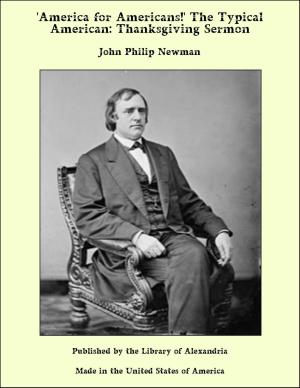Twice-born Men in America: The Psychology of Conversion as Seen by a Christian Psychologist in Rescue Mission Work
Nonfiction, Religion & Spirituality, New Age, History, Fiction & Literature| Author: | Harriet Earhart Monroe | ISBN: | 9781465610331 |
| Publisher: | Library of Alexandria | Publication: | March 8, 2015 |
| Imprint: | Language: | English |
| Author: | Harriet Earhart Monroe |
| ISBN: | 9781465610331 |
| Publisher: | Library of Alexandria |
| Publication: | March 8, 2015 |
| Imprint: | |
| Language: | English |
In January, 1908, a great calamity came to me in the form of destruction by fire of most of my earthly property and the death in the fire of a loved sister. The event had in it some other elements of great pain not necessary to mention here. If my soul had not been anchored in Jesus, the combination of sorrows would have broken down my mentality and sent me to the asylum. As it was, I stood steadily trusting God, knowing that all things worked together for good to those who love God. I was sure I was a lover of God, and so, while every fiber of my body and soul ached with unspeakable pain, I never doubted God's love, care and sympathy. In the midst of this grief I received a letter from Mr. George W. Wheeler, the President of the Executive Board of the Gospel Mission, saying about this, “Come down to the Gospel Mission, look it over and see if you care to come in with us in the work of saving souls. Unless we secure a woman of large executive ability, our work can scarcely go forward.” I answered that I would be glad to join them, and the next week, the first week of September, 1908, I received a letter from the Secretary, S. M. Croft, saying I had been elected to the Executive Board of the Gospel Mission, which met once every week. The following Monday I met with the Board, where I heard a letter from Mr. Tyson, saying that he withdrew from the Board because the dormitories were badly kept. Then followed a letter of the same kind from a Mr. Fritz, and another from Mr. Sidell. As soon as the session, which was largely a prayer service, was closed, Mr. Wheeler accompanied me to look over the dormitories. I never saw or dreamed of such conditions. The very walls were alive with vermin. In the story above the chapel were fifteen vile beds, and on the third story above us we saw a floor covered with dirty, wrinkled newspapers. I said, “Where do the men sleep?” “On the beds you saw in the third floor and on these newspapers.”
In January, 1908, a great calamity came to me in the form of destruction by fire of most of my earthly property and the death in the fire of a loved sister. The event had in it some other elements of great pain not necessary to mention here. If my soul had not been anchored in Jesus, the combination of sorrows would have broken down my mentality and sent me to the asylum. As it was, I stood steadily trusting God, knowing that all things worked together for good to those who love God. I was sure I was a lover of God, and so, while every fiber of my body and soul ached with unspeakable pain, I never doubted God's love, care and sympathy. In the midst of this grief I received a letter from Mr. George W. Wheeler, the President of the Executive Board of the Gospel Mission, saying about this, “Come down to the Gospel Mission, look it over and see if you care to come in with us in the work of saving souls. Unless we secure a woman of large executive ability, our work can scarcely go forward.” I answered that I would be glad to join them, and the next week, the first week of September, 1908, I received a letter from the Secretary, S. M. Croft, saying I had been elected to the Executive Board of the Gospel Mission, which met once every week. The following Monday I met with the Board, where I heard a letter from Mr. Tyson, saying that he withdrew from the Board because the dormitories were badly kept. Then followed a letter of the same kind from a Mr. Fritz, and another from Mr. Sidell. As soon as the session, which was largely a prayer service, was closed, Mr. Wheeler accompanied me to look over the dormitories. I never saw or dreamed of such conditions. The very walls were alive with vermin. In the story above the chapel were fifteen vile beds, and on the third story above us we saw a floor covered with dirty, wrinkled newspapers. I said, “Where do the men sleep?” “On the beds you saw in the third floor and on these newspapers.”















